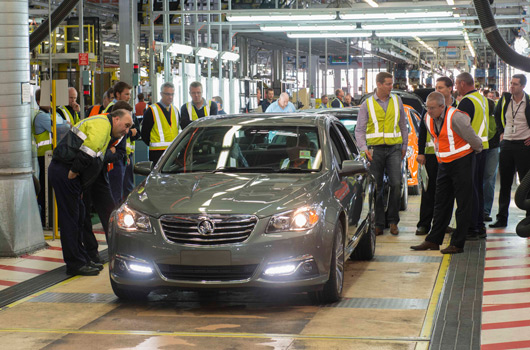The future of Australia’s automotive manufacturing sector has been in the news quite a bit lately. The decision by Ford to cease local manufacturing in 2016 has certainly helped. But increased scrutiny has also brought government assistance to the automotive sector into the spotlight.
In the face of declining sales the public is asking why the government is spending so much to support local manufacturing if the multinational companies making merry with our taxpayer’s loot are just going to leave anyway.
So the Federal Chamber of Automotive Industries is here to put things right. They’ve commissioned a report to investigate what would happen to the local economy if Holden and Toyota were to follow Ford’s lead and close down their factories by 2018.
The magic number produced by the FCAI report is $21.5 billion. Apparently that’s the size of the hole our economy would find itself dealing with if cars were no longer made in Australia.
As it currently stands Australians contribute $18 each on a per capita basis to come up with the $500 million passed on to the automotive sector. According to the FCAI report that investment gives a return of $934 per person, bringing us back to the impressive $21.5 billion figure.
That’s a pretty good return on investment, don’t you think.
You can download the FCAI report here (1.8mb PDF), all 86 pages of it. Yet in the whole report just two thirds of a page is set aside to discuss the demand for the motor vehicles made in Australia.
It’s true a potential $21.5 billion hit to our economy is no laughing matter, but unless the FCAI can come up with some buyers, you know, actual people who want to buy our locally made cars in sufficient numbers, then isn’t the end inevitable?
[Pic: GM Corp]
The real value of our automotive manufacturing industry
4 November 2013
The Australian economy would be $21.5 billion smaller if automotive manufacturing leaves the country in 2018. Melbourne and Adelaide will be heavily impacted with significant job losses and a long-term fall in gross regional product (GRP).
Economic analysis by Monash University’s Centre of Policy Studies and research by the Allen Consulting Group has identified the impacts Australia will see if automotive manufacturing in Australia ceases.
Releasing a Federal Chamber of Automotive Industries commissioned report with this analysis and research, Chief Executive Tony Weber said without Government support for automotive manufacturing, high-tech jobs and skills will be lost. He also said significant foreign direct investment would cease, as overseas headquarters redirect investments to other automotive manufacturing countries, not to other industries in Australia.
“This report shows the value of automotive manufacturing to Australia. It details the benefits to Australia as a whole—to the economy, communities, the supply chain and other industries. The FCAI will be using this report as a basis for our submission to the Productivity Commission’s review of the automotive sector. I want to be clear: financial support for the industry is an investment in Australia and this investment needs to be long-term,†Mr Weber said.
“For that investment, Australians receive significant returns through direct foreign investment, employment, skills, training, technology transfer and research. And the investment also generates spill-overs that flow into other industries and areas of the economy. Without that investment, we lose these long-lasting benefits.â€
Key points from the report
- Automotive manufacturing in Australia receives around $500 million in Government funding each year. For this investment, the Australian economy is $21.5 billion larger (based on an economic welfare net present value calculation).
- The modelling worked on a scenario where Australian automotive manufacturing shuts down over a two-year period from 2017 to 2018.
- On a per person basis, Government assistance to automotive manufacturing is around $18 per person—a very low figure by international standards. The $21.5 billion return equates to $934 per person in benefit.
- Australia would be a very different place without automotive manufacturing. If we lost this important capability:
- Australia’s GDP would be $7.3 billion smaller (in today’s dollars) by 2018.
- Billions in foreign direct investment would cease, as head offices direct investment to other automotive manufacturing countries, not to other industries in Australia.
- Employment losses in Melbourne would equate to some 33,000 jobs in 2018, and around 6,600 in Adelaide. These jobs would eventually return in both cities, but with lower real wages. And employment levels would not return until around 2027 for Melbourne and 2025 for Adelaide.
- The economies of Adelaide and Melbourne would be heavily impacted with gross regional product (GRP) contracted by up to 1.4 per cent and it is likely GRP will be lower than pre-closure levels until the end of 2031, while employment could fall by around 1.5 per cent.
- These impacts do not include the spill-over effects, including to advanced manufacturing and research and development (R&D), which cannot be modelled, but are recognised by chief executives of companies like Boeing, Rio Tinto and Coca-Cola Amatil. These include:
- technology transfers through R&D and innovation;
- lean management techniques and applications; and
- advanced labour skills and manufacturing techniques.
- The report found that if barriers to export were removed and the Australian industry could return to 2008 levels of exports (when 160,000 vehicles were exported), Australia’s consumer welfare would increase by $7.1 billion over time.

2 replies on “The elephant in the assembly hall”
well if you have a look at the sales of the vf commodore. It has spiked since the new release came out. The problem with the commodores sales was that the VE was long in the tooth. The VF should be replaced in 2-3 years by a VG Commodore. Some nice new technology to woo the market back.
[…] elephant in the room seems to be that local carmakers—Holden, Ford and Toyota—aren’t making cars that people […]